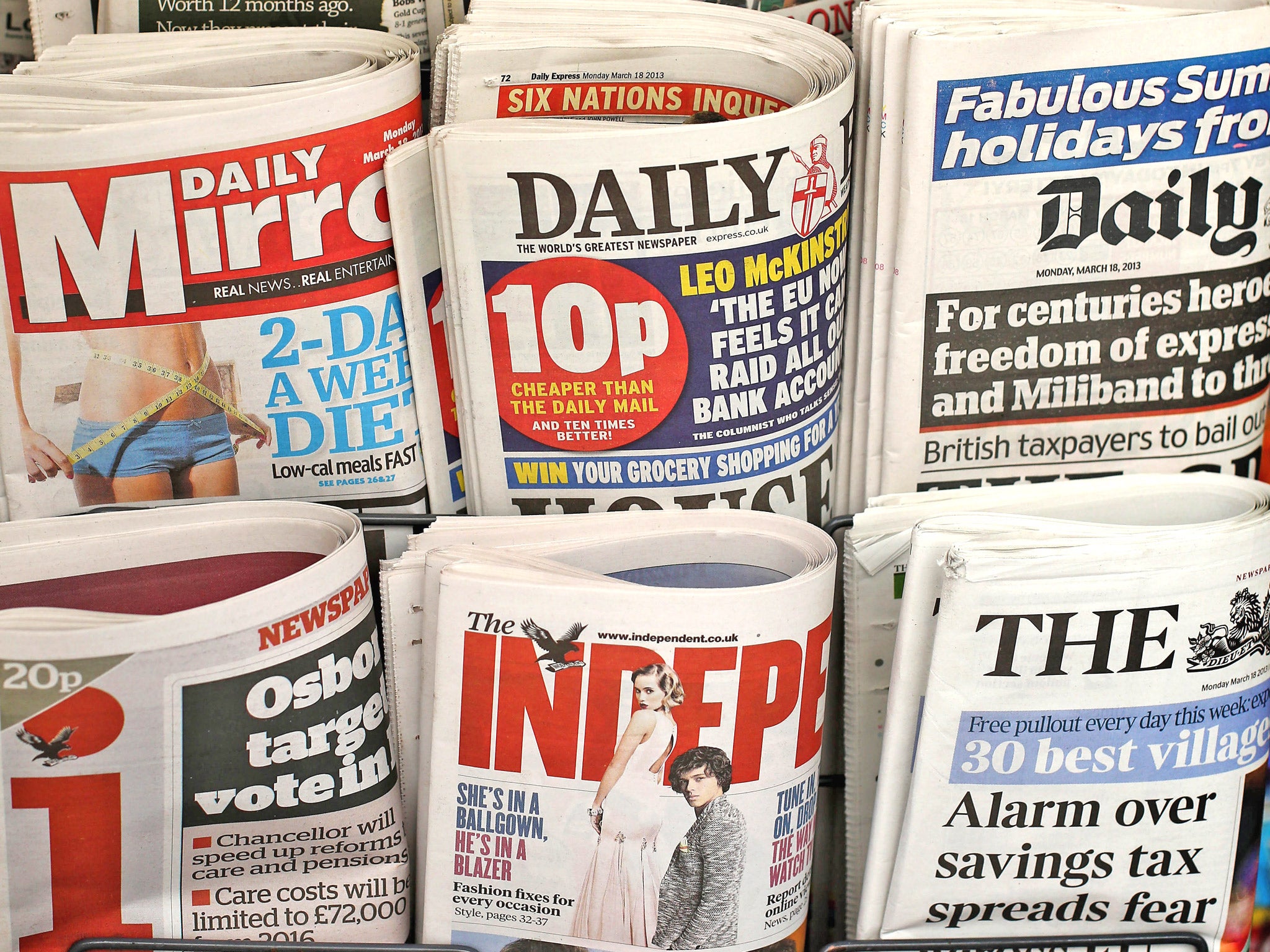David Cameron set to defy newspaper industry over press regulation
Government fears public fury if it gives in to press lobby

David Cameron is set to reject moves by three of the country’s largest newspaper groups to water down the proposed Royal Charter creating a new regulatory system for the press.
The Prime Minister risks upsetting Conservative-supporting papers by sticking to the deal agreed by the three main parties for a charter to implement a tougher system of independent self-regulation proposed by the Leveson Inquiry following the phone- hacking scandal.
Mr Cameron wants newspapers to reach a common position so that the new system is workable and effective, but the industry is divided.
Last week, Rupert Murdoch’s News International, the Mail and the Telegraph groups proposed an alternative charter, calling for politicians to be denied the right to amend it. They had been the most vocal in their opposition to the version agreed by the Tories, Labour and Liberal Democrats.
Other groups, notably The Guardian, Financial Times and The Independent, had reservations about the original charter but were not as hostile. The Guardian and The Independent have since given the second charter their qualified support but do not believe it sets up a system that is sufficiently “independent” of the industry to satisfy the press’s critics inside and outside Parliament.
The industry’s split poses a difficult dilemma for Mr Cameron. But close allies say he will abide by the cross-party deal, which also won the support of both Houses of Parliament, and does not want to reopen the issue.
A Downing Street source told The Independent: “The Royal Charter put forward by the three parties and agreed after 22 weeks of consultation with the newspaper industry is the one we think should go forward.”
The rival charter was submitted to the Privy Council office today.
Officials at the Department for Culture Media and Sport (DCMS) will examine it. But ministers believe it is highly unlikely that two rival charters would be submitted to the Privy Council, which meets on 15 May, as this would risk drawing the Queen into politics.
Conservative ministers believe the public would not understand if the Government retreated from an agreement that enjoyed the support of politicians and Hacked Off – the group which campaigns for the victims of hacking – under pressure from newspapers.
One said: “The industry needs to get its act together. It should realise that this is an opportunity to resolve the issue of regulation once and for all, and that it could end up with something much worse under a future administration – even a full-scale press law.”
Labour and the Liberal Democrats are keener on statutory regulation than the Conservatives, raising the prospect of legislation if there was a Labour government or Lib-Lab coalition after the 2015 election.
A retreat would be politically difficult for Mr Cameron. He has already made one U-turn on how to implement Lord Justice Leveson’s recommendations, calling off deadlocked three-party talks in March only to restart them and reach a deal four days later.
Downing Street is believed to have reassured Ed Miliband and Nick Clegg that Mr Cameron will not be lured away from the agreement struck at 2.30am in the Labour leader’s office. Oliver Letwin, the Cabinet Office Minister and Tory policy chief, who joined Mr Miliband and Mr Clegg at the talks, is also standing by it. “There is no wobble,” one insider said.
A Labour source said: “The newspapers who have come up with their own charter are trying to muddy the waters and stop us going ahead. But it isn’t working.”
The source dismissed claims that Hacked Off, which had four representatives at the crucial talks, had called the shots, saying that Mr Letwin had consulted the newspapers closely, even though they were not present.
The rival blueprint reinstated a proposal for a “whistleblowers’ charter” for journalists who want to alert the new regulatory body to bad practice, which had been dropped from the three groups’ original plan last week. But party officials said its language on corrections and apologies when papers make mistakes was not as strong as in the charter agreed by the politicians.
In a statement co-ordinated by the Newspaper Society last week, the industry warned that the cross-party scheme had “no support within the press”, amid fears that some papers would refuse to sign up to it.
The industry argues that its proposals would meet the Leveson recommendations and impose the most rigorous system of press regulation in the Western world, while keeping the press free from state control and interference by politicians.
Some Conservative MPs, including John Whittingdale, chairman of the Culture, Media and Sport Select Committee, have urged Mr Cameron to take the alternative plan “very seriously”.
But Hacked Off accused the industry of “unilaterally rejecting” the Leveson findings and proposing a new regulator that would be the “poodle” of the press.g
Join our commenting forum
Join thought-provoking conversations, follow other Independent readers and see their replies
Comments